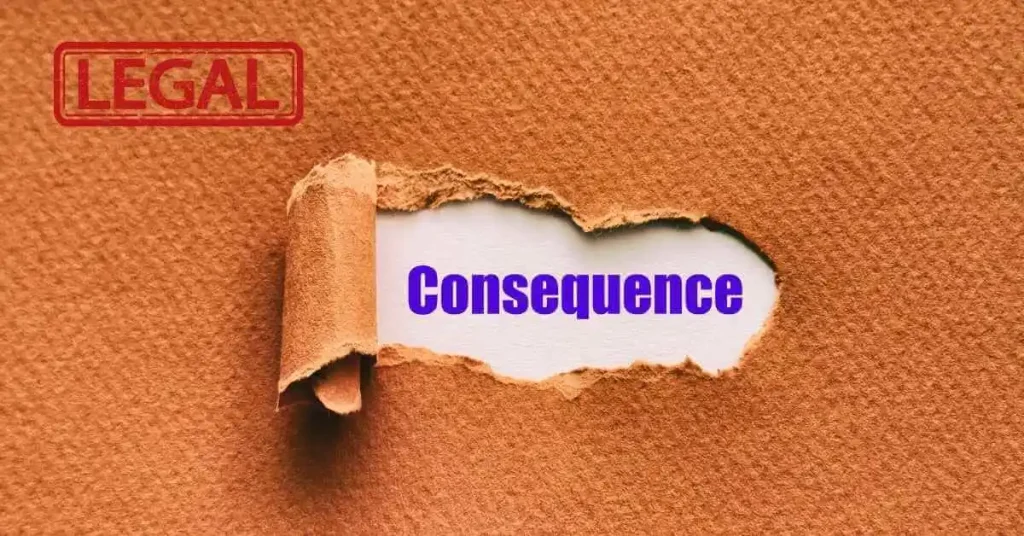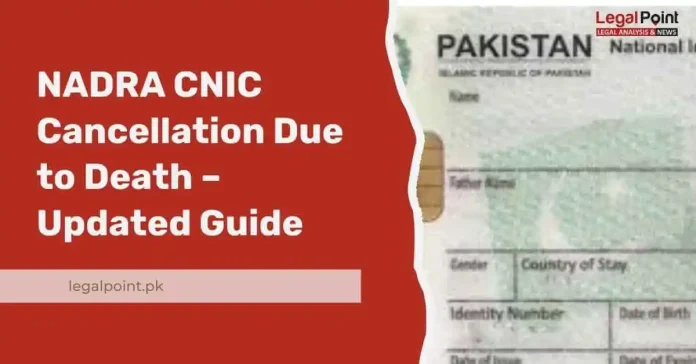Introduction
The cancellation of a deceased person’s CNIC (Computerized National Identity Card) is an important legal step in Pakistan.
NADRA (National Database and Registration Authority) ensures that the identity of a deceased individual is properly recorded to prevent misuse and fraudulent activities.
If the CNIC is not canceled, it can lead to legal and financial complications for the heirs, such as inheritance disputes and unauthorized use of the deceased’s identity.
This guide explains the complete process of NADRA CNIC cancellation, the required documents, fees, tracking options, and legal implications.
Table of Contents
What is NADRA CNIC Cancellation?
NADRA CNIC cancellation is the official process of deactivating a deceased person’s identity card in the national database.
This ensures that the person is no longer listed as active in government records.
The cancellation process is crucial for updating legal records and inheritance claims and ensuring that no one can misuse the deceased’s identity for illegal activities.
Once the CNIC is canceled, NADRA issues a cancellation certificate, which serves as proof that the person has been legally declared deceased in government records.
Who Can Apply for NADRA CNIC Cancellation?
The process of CNIC cancellation can only be initiated by immediate family members or legal heirs of the deceased.
Typically, the following individuals are eligible to apply:
- Spouse of the deceased
- Son or daughter (adult)
- Parents of the deceased
- Siblings (if no immediate heirs are available)
- A legal representative with authorized documents
NADRA requires proof of relationship with the deceased before processing the request. The applicant must also provide their own valid CNIC for verification.
Also Read: How to apply for CNIC Online
Documents Required for CNIC Cancellation of a Deceased Person

To ensure a smooth cancellation process, applicants must submit the following documents to NADRA:
- Original CNIC of the deceased
- Death certificate issued by the Union Council
- Applicant’s own CNIC (to verify relationship)
- Affidavit confirming the applicant’s relationship with the deceased
- Family registration certificate (FRC) from NADRA (if required)
In some cases, NADRA may request additional documents for verification, especially if there are disputes regarding legal heirs.
Before visiting, it is advisable to check with the local NADRA center for any updated requirements.
Step-by-Step Process for NADRA CNIC Cancellation
The cancellation process follows a structured procedure at NADRA offices. Here’s how to apply:
1. Visit the Nearest NADRA Registration Center (NRC)
The applicant must visit a NADRA office that processes CNIC cancellations. Some NADRA executive centers may also provide this service.
2. Submit the Documents
The applicant needs to present the original CNIC of the deceased, along with all other necessary documents for verification.
3. Biometric Verification and Application Submission
The applicant will provide biometric verification (fingerprints) to confirm their identity before submitting the application.
4. Processing and Issuance of CNIC Cancellation Certificate
Once the request is processed, NADRA will deactivate the CNIC and issue a cancellation certificate. The processing time varies but typically takes a few days to a couple of weeks.
If you need any expert help regarding CNIC cancellation or any other issue, call us at 03337703712 or contact us today for stress-free solutions.
NADRA CNIC Cancellation Fee

The cancellation of a CNIC due to death generally has a nominal fee. NADRA’s fee structure varies based on processing speed:
- Regular Processing: The standard fee applies, and the cancellation takes 10-15 working days.
- Urgent Processing: For those who need the cancellation certificate quickly, NADRA offers an urgent service for an additional fee, typically reducing the processing time to 5-7 working days.
Applicants are advised to check the latest fee structure on NADRA’s official website or by visiting the nearest NADRA center.
NADRA CNIC Cancellation Certificate
After the CNIC cancellation process is complete, NADRA issues a CNIC Cancellation Certificate as proof that the deceased person’s identity has been officially deactivated.
This certificate is often required for legal purposes, such as:
- Transferring property and inheritance
- Updating government records and pension claims
- Closing bank accounts or settling financial matters
Applicants should ensure they collect this certificate once the process is complete, as it serves as an essential document for legal heirs.
More to Read: How to Apply for a Succession Certificate in Pakistan via NADRA
NADRA ID Card Cancellation Tracking
Applicants can track the status of their CNIC cancellation application through NADRA’s online and offline services. The tracking process includes:
Online Tracking: NADRA provides an online tracking system where applicants can enter their application number and check the status.
SMS Tracking: Applicants can send an SMS with their application ID to NADRA’s tracking number to receive an update.
Visiting NADRA Office: Those who prefer in-person updates can visit the NADRA office where they submitted their application and inquire about the status.
NADRA CNIC Cancellation Online – Is It Possible?
Currently, NADRA does not offer a fully online CNIC cancellation process.
The application must be submitted in person at a NADRA Registration Center. However, applicants can:
- Download the application form online before visiting NADRA.
- Use NADRA’s helpline for guidance on required documents.
- Track the application status online after submission.
While NADRA is gradually digitizing its services, in-person verification remains necessary for CNIC cancellation due to the sensitive nature of identity records.
What are the Legal Consequences of not canceling a CNIC After Death?

Failing to cancel a deceased person’s CNIC can lead to various legal and financial risks, such as:
Identity Fraud: An active CNIC can be misused for illegal activities, including financial fraud and property claims.
Inheritance Disputes: Government records will not reflect the person’s death, causing issues in property distribution and legal matters.
Bank Account Misuse: Without CNIC cancellation, bank accounts may remain active, leading to potential financial complications.
Timely CNIC cancellation ensures that the deceased person’s records are updated, reducing the chances of identity theft or misuse.
Also Read: How to Change Your Name on a CNIC in Pakistan
Conclusion
NADRA CNIC cancellation due to death is a crucial legal process that safeguards against identity fraud and ensures proper inheritance procedures.
The process is straightforward but requires essential documents and biometric verification. By following the correct procedure, legal heirs can obtain a CNIC cancellation certificate, which is necessary for various legal and financial matters.
If you need assistance with the CNIC cancellation process, visit your nearest NADRA Registration Center or check NADRA’s official website for the latest guidelines.
If you need any expert help regarding CNIC cancellation or any other issue, call us at 03337703712 or contact us today for stress-free solutions.



